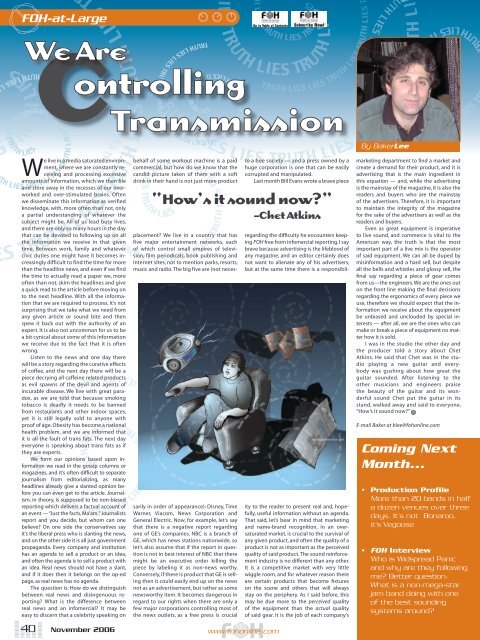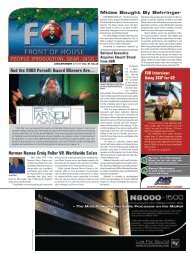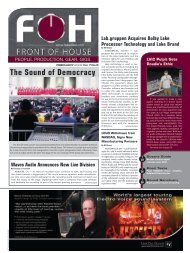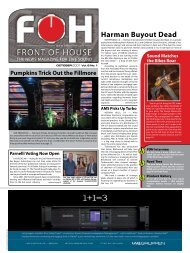Create successful ePaper yourself
Turn your PDF publications into a flip-book with our unique Google optimized e-Paper software.
<strong>FOH</strong>-at-Large<br />
C<br />
We live in a media saturated environment,<br />
where we are constantly receiving<br />
and processing excessive<br />
amounts of information, which we then file<br />
and store away in the recesses of our overworked<br />
and over-stimulated brains. Often<br />
we disseminate this information as verified<br />
knowledge, with, more often than not, only<br />
a partial understanding of whatever the<br />
subject might be. All of us lead busy lives,<br />
and there are only so many hours in the day<br />
that can be devoted to following up on all<br />
the information we receive in that given<br />
time. Between work, family and whatever<br />
civic duties one might have it becomes increasingly<br />
difficult to find the time for more<br />
than the headline news, and even if we find<br />
the time to actually read a paper we, more<br />
often than not, skim the headlines and give<br />
a quick read to the article before moving on<br />
to the next headline. With all the information<br />
that we are required to process, it’s not<br />
surprising that we take what we need from<br />
any given article or sound bite and then<br />
spew it back out with the authority of an<br />
expert. It is also not uncommon for us to be<br />
a bit cynical about some of this information<br />
we receive due to the fact that it is often<br />
wrong.<br />
Listen to the news and one day there<br />
will be a story regarding the curative effects<br />
of coffee, and the next day there will be a<br />
piece decrying all caffeine related products<br />
as evil spawns of the devil and agents of<br />
incurable disease. We live with great paradox,<br />
as we are told that because smoking<br />
tobacco is deadly it needs to be banned<br />
from restaurants and other indoor spaces,<br />
yet it is still legally sold to anyone with<br />
proof of age. Obesity has become a national<br />
health problem, and we are informed that<br />
it is all the fault of trans fats. The next day<br />
everyone is speaking about trans fats as if<br />
they are experts.<br />
We form our opinions based upon information<br />
we read in the gossip columns or<br />
magazines, and it’s often difficult to separate<br />
journalism from editorializing, as many<br />
headlines already give a slanted opinion before<br />
you can even get to the article. Journalism,<br />
in theory, is supposed to be non-biased<br />
reporting which delivers a factual account of<br />
an event — “Just the facts, Ma’am.” Journalists<br />
report and you decide, but whom can one<br />
believe? On one side the conservatives say<br />
it’s the liberal press who is slanting the news,<br />
and on the other side it is all just government<br />
propaganda. Every company and institution<br />
has an agenda to sell a product or an idea,<br />
and often the agenda is to sell a product with<br />
an idea. Real news should not have a slant,<br />
and if it does then it belongs on the op-ed<br />
page, as real news has no agenda.<br />
The question is: How do we distinguish<br />
between real news and disingenuous reporting?<br />
What is the difference between<br />
real news and an infomercial? It may be<br />
easy to discern that a celebrity speaking on<br />
behalf of some workout machine is a paid<br />
commercial, but how do we know that the<br />
candid picture taken of them with a soft<br />
drink in their hand is not just more product<br />
“How’s it sound now?”<br />
–Chet Atkins<br />
placement? We live in a country that has<br />
five major entertainment networks, each<br />
of which control small empires of television,<br />
film periodicals, book publishing and<br />
Internet sites, not to mention parks, resorts,<br />
music and radio. The big five are (not neces-<br />
sarily in order of appearance): Disney, Time<br />
Warner, Viacom, News Corporation and<br />
General Electric. Now, for example, let’s say<br />
that there is a negative report regarding<br />
one of GE’s companies. NBC is a branch of<br />
GE, which has news stations nationwide, so<br />
let’s also assume that if the report in question<br />
is not in best interest of NBC that there<br />
might be an executive order killing the<br />
piece by labeling it as non-news worthy.<br />
Conversely, if there is product that GE is selling<br />
then it could easily end up on the news<br />
not as an advertisement, but rather as some<br />
newsworthy item. It becomes dangerous in<br />
regard to our rights when there are only a<br />
few major corporations controlling most of<br />
the news outlets, as a free press is crucial<br />
40 November 2006 www.fohonline.com<br />
to a free society — and a press owned by a<br />
huge corporation is one that can be easily<br />
corrupted and manipulated.<br />
Last month Bill Evans wrote a brave piece<br />
regarding the difficulty he encounters keeping<br />
<strong>FOH</strong> free from infomercial reporting. I say<br />
brave because advertising is the lifeblood of<br />
any magazine, and an editor certainly does<br />
not want to alienate any of his advertisers,<br />
but at the same time there is a responsibil-<br />
andy.au@verizon.net<br />
ity to the reader to present real and, hopefully,<br />
useful information without an agenda.<br />
That said, let’s bear in mind that marketing<br />
and name-brand recognition, in an oversaturated<br />
market, is crucial to the survival of<br />
any given product, and often the quality of a<br />
product is not as important as the perceived<br />
quality of said product. The sound reinforcement<br />
industry is no different than any other.<br />
It is a competitive market with very little<br />
wiggle room, and for whatever reason there<br />
are certain products that become fixtures<br />
on the scene and others that will always<br />
stay on the periphery. As I said before, this<br />
may be due more to the perceived quality<br />
of the equipment than the actual quality<br />
of said gear. It is the job of each company’s<br />
By BakerLee<br />
marketing department to find a market and<br />
create a demand for their product, and it is<br />
advertising that is the main ingredient in<br />
this equation — and, while the advertising<br />
is the mainstay of the magazine, it is also the<br />
readers and buyers who are the mainstay<br />
of the advertisers. Therefore, it is important<br />
to maintain the integrity of the magazine<br />
for the sake of the advertisers as well as the<br />
readers and buyers.<br />
Even as great equipment is imperative<br />
to live sound, and commerce is vital to the<br />
American way, the truth is that the most<br />
important part of a live mix is the operator<br />
of said equipment. We can all be duped by<br />
misinformation and a hard sell, but despite<br />
all the bells and whistles and glossy sell, the<br />
final say regarding a piece of gear comes<br />
from us—the engineers. We are the ones out<br />
on the front line making the final decisions<br />
regarding the ergonomics of every piece we<br />
use, therefore we should expect that the information<br />
we receive about the equipment<br />
be unbiased and unclouded by special interests<br />
— after all, we are the ones who can<br />
make or break a piece of equipment no matter<br />
how it is sold.<br />
I was in the studio the other day and<br />
the producer told a story about Chet<br />
Atkins. He said that Chet was in the studio<br />
playing a new guitar and everybody<br />
was gushing about how great the<br />
guitar sounded. After listening to the<br />
other musicians and engineers praise<br />
the beauty of the guitar and its wonderful<br />
sound Chet put the guitar in its<br />
stand, walked away and said to everyone,<br />
“How’s it sound now?”<br />
E-mail Baker at blee@fohonline.com<br />
Coming Next<br />
Month...<br />
• Production Profile<br />
More than 20 bands in half<br />
a dozen venues over three<br />
days. It’s not Bonaroo,<br />
it’s Vegoose<br />
• <strong>FOH</strong> Interview<br />
Who is Widspread Panic<br />
and why are they following<br />
me? Better question:<br />
What is a non-mega-star<br />
jam band doing with one<br />
of the best sounding<br />
systems around?

















